
The archbishop of Canterbury is the senior bishop and a principal leader of the Church of England, the ceremonial head of the worldwide Anglican Communion and the bishop of the Diocese of Canterbury. The current archbishop is Justin Welby, who was enthroned at Canterbury Cathedral on 21 March 2013. Welby is the 105th person to hold the position, as part of a line of succession going back to the "Apostle to the English" Augustine of Canterbury, who was sent to the island by the church in Rome in 597. Welby succeeded Rowan Williams.
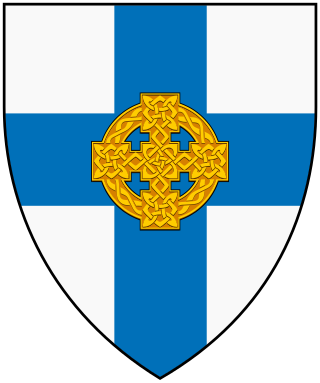
The Church in Wales is an Anglican church in Wales, composed of six dioceses.
A suffragan bishop is a type of bishop in some Christian denominations.

The Lords Spiritual are the bishops of the Church of England who sit in the House of Lords of the United Kingdom. Up to 26 of the 42 diocesan bishops and archbishops of the Church of England serve as Lords Spiritual. The Church of Scotland, which is Presbyterian, and the Anglican churches in Wales and in Northern Ireland, which are no longer established churches, are not represented. The Lords Spiritual are distinct from the Lords Temporal, their secular counterparts who also sit in the House of Lords.
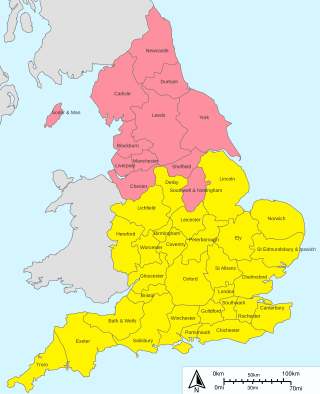
The Province of Canterbury, or less formally the Southern Province, is one of two ecclesiastical provinces which constitute the Church of England. The other is the Province of York.
The General Synod is the tricameral deliberative and legislative organ of the Church of England. The synod was instituted in 1970, replacing the Church Assembly, and is the culmination of a process of rediscovering self-government for the Church of England that had started in the 1850s.

The history of the Anglican Communion may be attributed mainly to the worldwide spread of British culture associated with the British Empire. Among other things the Church of England spread around the world and, gradually developing autonomy in each region of the world, became the communion as it exists today.
In canon law the confirmation of a bishop is the act by which the election of a new bishop receives the assent of the proper ecclesiastical authority.

The Bishop of Winchester is the diocesan bishop of the Diocese of Winchester in the Church of England. The bishop's seat (cathedra) is at Winchester Cathedral in Hampshire. The Bishop of Winchester has always held ex officio the office of Prelate of the Most Noble Order of the Garter since its foundation in 1348, and Bishops of Winchester often held the positions of Lord Treasurer and Lord Chancellor ex officio. During the Middle Ages, it was one of the wealthiest English sees, and its bishops have included a number of politically prominent Englishmen, notably the 9th century Saint Swithun and medieval magnates including William of Wykeham and Henry of Blois.
The Archbishop of Dublin is the head of the Archdiocese of Dublin in the Catholic Church, responsible for its spiritual and administrative needs. The office has existed since 1152, in succession to a regular bishopric since 1028. The archdiocese is the metropolitan see of the ecclesiastical province of Dublin, and the archbishop is also styled the Primate of Ireland. The cathedral church of the archdiocese is Saint Mary's Pro-Cathedral in Dublin city, although the Church formally claims Christ Church as its cathedra, and the archbishop's residence is Archbishop's House in Drumcondra.

Primates in the Anglican Communion are the most senior bishop or archbishop of one of the 42 churches of the Anglican Communion. The Church of England, however, has two primates, the Archbishop of Canterbury and the Archbishop of York.
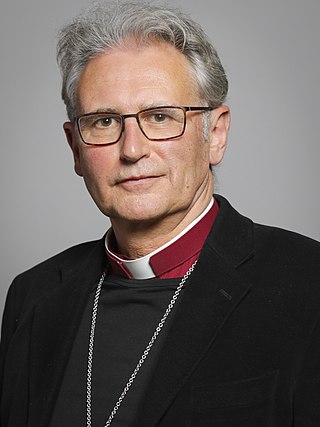
Christopher John Cocksworth is a Church of England bishop in the open evangelical tradition. Since 2008, he has been Bishop of Coventry. Prior to becoming bishop, he was a university chaplain and the Principal of Ridley Hall, Cambridge (2001−2008). In June 2023, he was announced as the next Dean of Windsor.
The Bishop of Berwick is an episcopal title used by the suffragan bishop of the Church of England Diocese of Newcastle in the Province of York, England.
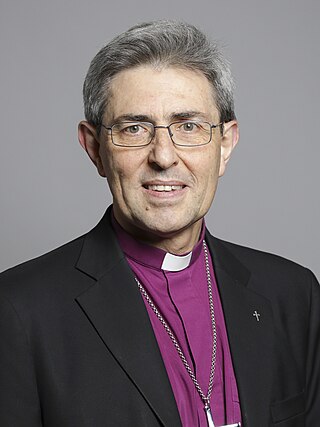
Timothy John Dakin is a retired Anglican bishop. He was the general secretary of the Church Mission Society (CMS) and the South American Missionary Society (SAMS) prior to his consecration. He was appointed as Bishop of Winchester in 2011, and, as such became an ex officio member of the House of Lords. From 2013 he served as the Bishop for Higher and Further Education.

Rachel Treweek is an English Anglican bishop who sits in the House of Lords as a Lord Spiritual.

Philip John North is a bishop in the Church of England. Since April 2023, he has served as Bishop of Blackburn, the diocesan bishop of the Diocese of Blackburn. He was previously Bishop of Burnley, a suffragan bishop in the same diocese, since 2015; and team rector of the parish of Old St Pancras.
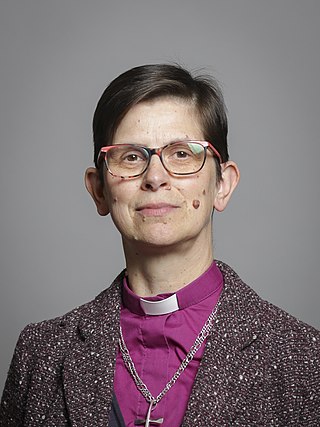
Elizabeth Jane Holden Lane is a British Anglican bishop and Lord Spiritual. Since February 2019, she has served as Bishop of Derby in the Church of England, the diocesan bishop of the Diocese of Derby. From January 2015 to 2019, she was the Bishop of Stockport, a suffragan bishop in the Diocese of Chester. She was the first woman to be appointed as a bishop by the Church of England, after its general synod voted in July 2014 to allow women to become bishops. Her consecration took place on 26 January 2015 at York Minster.

Janet Elizabeth "Jan" McFarlane is a British Church of England bishop and former speech and language therapist. She has been a Canon Residentiary of Lichfield Cathedral and honorary assistant bishop in the Diocese of Lichfield since 2020. In April 2023 she was appointed interim Dean of Lichfield Cathedral. She previously served as Bishop of Repton since her consecration as a bishop on 29 June 2016; and (additionally) Acting Bishop of Derby from 31 August 2018 to February 2019.
Deborah Mary Sellin is a Church of England bishop serving as Bishop of Southampton, a suffragan bishop in the Diocese of Winchester, and acting as diocesan Bishop of Winchester.











